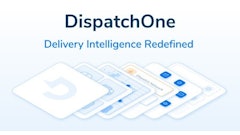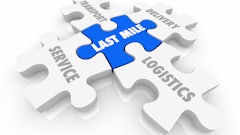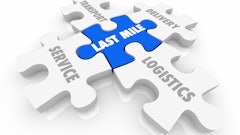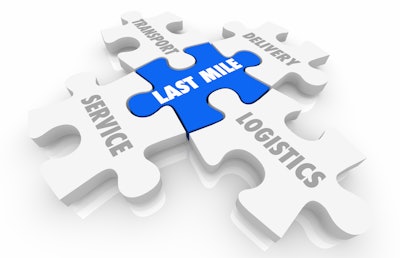
How many retailers expand their e-commerce operations, confident their carefully crafted supply chain could handle the increased volume, only to have customer complaints flood in? From damaged products arriving weeks late to customers left waiting during four-hour delivery windows only to receive last-minute cancellations, challenges plague even companies negotiating favorable terms with national carriers.
Too often, that final customer handoff — the only part many customers ever see — undermines the entire brand experience. Even worse, these struggles aren’t unique but epitomize a growing challenge across retail, manufacturing and distribution sectors.
The mounting challenges of final-mile delivery
Across the supply chain, the final mile represents just a fraction of the shipment’s journey but accounts for up to 53% of total delivery costs, up from just 41% in 2018. The final mile’s disproportionate expense stems from complex challenges that strain supply chain operations across industries: high operational costs, inefficient routing, lack of granular tracking capabilities and constantly evolving customer expectations.
Imagine a customer ordering a new appliance. Without real-time tracking capabilities, they might take a day off work to wait for a delivery that never arrives, resulting in a frustrating situation that not only damages the customer relationship but also leads to costly redelivery attempts. Rippling throughout the delivery ecosystem, this limited visibility and fundamental lack of tracking transparency impacts everyone from warehouse managers to end customers.
Route optimization presents another significant challenge. Without advanced planning tools, delivery routes often follow inefficient paths, leading to increased fuel consumption, extended delivery times and higher labor costs — inefficiencies that directly impact operational expenses and customer satisfaction metrics.
As daunting as these individual challenges are, they pale compared to the complications of attempting to address them with disjointed, piecemeal solutions.
The piecemeal approach: A recipe for failure
What makes these challenges particularly flustering is the patchwork of disparate systems that don’t communicate effectively with one another — separate platforms for order management, inventory tracking, routing and customer communications.
A fragmented technology landscape creates operational silos that impede information flow across different departments and stakeholders throughout the supply chain. When customer service teams can’t access the same delivery information as drivers or warehouse staff work from data different from dispatchers, miscommunications and errors inevitably arise.
What are the consequences of this disjointed approach? According to a 2023 study by Qualtrics XM Institute, U.S. businesses lose $856 billion annually due to poor customer service. In the fast-paced delivery context, bad customer service translates to missed delivery windows, inadequate customer communication and, ultimately, damaged brand reputation.
These issues become even more pronounced for companies shipping high-value or bulky items. When a customer’s expensive furniture arrives damaged, the financial and reputational damage swells considerably. Delivery service quality directly affects a company’s brand reputation, customer satisfaction and bottom line.
Fortunately, the industry is evolving beyond this fragmented approach, with innovative solutions emerging to address the complexity of final-mile logistics.
How integration bridges the final-mile gap
Advanced final-mile delivery solutions address these varied challenges by offering comprehensive, integrated platforms that seamlessly coordinate the entire delivery process. Integrated, end-to-end logistics and supply chain management solutions bridge the gap from the manufacturer’s warehouse to the customer’s doorstep.
Rather than combining multiple solutions, forward-thinking companies increasingly adopt unified platforms that handle everything from order entry to route optimization and real-time tracking to customer communications and proof of delivery. Harnessing an integrated approach can eliminate information silos while creating a single source of truth for all stakeholders.
Modern platforms optimize routes based on multiple variables — traffic patterns, delivery time windows, vehicle capacities, etc. — using advanced technologies like artificial intelligence, GPS tracking and automated customer communications. Technological advances help significantly reduce delivery costs while improving on-time performance.
Real-time visibility allows internal teams to track shipments with unprecedented granularity. When customers know exactly when to expect their deliveries, they can plan accordingly, reducing failed delivery attempts and improving overall satisfaction.
While modern technology platforms form the backbone of effective final-mile delivery, selecting the right partner to execute this critical service requires careful consideration.
3 essential factors for selecting a trustworthy delivery partner
Businesses looking to elevate their final-mile delivery performance must select the right partner. Here are the three most important considerations:
1. Crystal clear communication
Open and honest communication forms the foundation of any successful delivery partnership. Go beyond basic tracking information and seek solutions that include proactive notifications, easy access to delivery details and responsive customer service.
A trustworthy delivery partner should provide:
- Real-time status updates throughout the delivery journey.
- Proactive alerts about potential delays or issues.
- Multiple communication channels for both businesses and end customers.
- Clear documentation and proof of delivery.
Actionable advice: When evaluating potential partners, ask about their communication protocols. Do they offer proactive updates via SMS and email? Do they have a dedicated customer service team available to answer questions? Request examples of their customer communication materials.
2. A proven track record
Experience and reliability help drive peace of mind in final-mile delivery. Companies should seek partners with established histories of successful deliveries, particularly for items similar to their own products. Recent high-profile delivery incidents highlight the value of partnering with established providers that demonstrate long-term reliability and the ability to handle unexpected logistics challenges that inevitably arise.
Actionable advice: Look beyond years in business and ask for specific examples of successful deliveries for products similar to yours. Request references from clients in your industry and inquire about their on-time delivery rates and damage claim ratios.
3. Safety-first approach
Protecting cargo and ensuring driver safety should be nonnegotiable priorities. Any delivery partner’s commitment to safety should start with comprehensive training programs and extend to vehicle maintenance, secure handling procedures and ongoing safety monitoring.
The best delivery providers make safety and reliability an integral part of their operational DNA, with clear procedures for handling everything from routine deliveries to complex installation services. A commitment to safety protects not only valuable cargo but also the reputation of the businesses they serve.
Actionable advice: Inquire about the partner’s driver training programs, vehicle maintenance procedures and safety protocols. Ask about their incident rates and how they handle safety violations.
Armed with these criteria and an understanding of what makes for exceptional final-mile delivery, businesses can chart a clear course toward delivery excellence that strengthens their competitive position.
Forging a path forward
As consumer expectations evolve, the final mile will only grow in importance as a competitive differentiator. Selecting delivery partners that excel in communication, demonstrate proven reliability and prioritize safety empowers companies to transform the final mile from a persistent challenge into a competitive advantage. The most successful organizations will leverage integrated delivery platforms that provide complete visibility and control, eliminating the fragmented approach that hindered past progress.
The final mile may represent just a tiny portion of a product’s journey, but it creates the lasting impression that shapes customer perception and drives future purchasing decisions. By focusing on this crucial touch point, businesses can build stronger customer relationships, enhance brand reputation and drive sustainable growth in an increasingly competitive marketplace.
![Pros To Know 2026 [color]](https://img.sdcexec.com/mindful/acbm/workspaces/default/uploads/2025/08/prostoknow-2026-color.mduFvhpgMk.png?auto=format%2Ccompress&bg=fff&fill-color=fff&fit=fill&h=100&q=70&w=100)
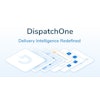


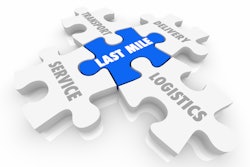

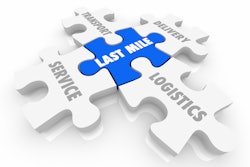


![Pros To Know 2026 [color]](https://img.sdcexec.com/mindful/acbm/workspaces/default/uploads/2025/08/prostoknow-2026-color.mduFvhpgMk.png?ar=16%3A9&auto=format%2Ccompress&bg=fff&fill-color=fff&fit=fill&h=135&q=70&w=240)
